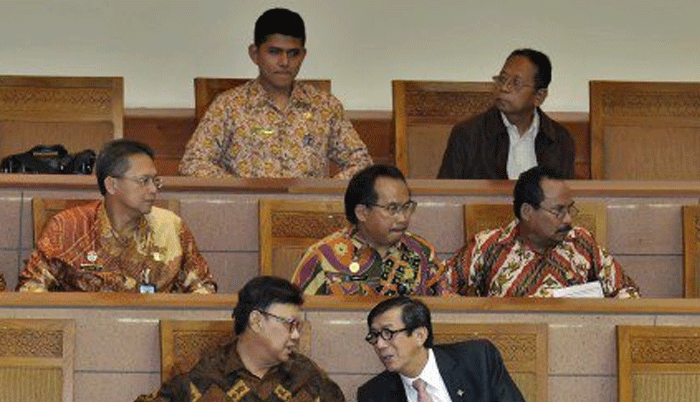![]() Home > Indonesia
Home > Indonesia
Govt To Reverse Democratic Gains

Home Affairs Minister Tjahjo Kumolo (left) speaks with Justice and Human Rights Minister Yasonna Laoly (right) during the plenary meeting passing the Regional Elections Law at the House of Representatives on June 2. Tjahjo said on Thursday that the ministry would hand the proposed amendment to law to the House in September.(Antara/Yudhi Mahatma)
![]() September 15th, 2016 | 08:42 AM |
September 15th, 2016 | 08:42 AM | ![]() 1055 views
1055 views
JAKARTA
If the government gets its way, voters in the 2019 legislative elections will have little say in deciding who is elected a legislator in the House of Representatives.
In a proposal that will likely be endorsed by the House, the government plans to change the country’s voting system from an open-list variant of proportional representation to one that is closer to the closed-list system used by the authoritarian New Order regime.
Under the new plan, hatched by Home Minister Tjahjo Kumolo, a stalwart member of the Indonesian Democratic Party of Struggle (PDI-P), the government will propose to the House what it calls an “open-limited” system, under which political parties will have the authority to determine which of their candidates fill legislative seats in the House, regardless of the votes garnered by the particular candidates.
Under today’s open-list system, used in the 2009 and 2014 legislative elections, voters vote for candidates whose names appear on the ballot paper and candidates are elected after meeting the required quota of votes needed to win a seat.
With the open-limited system proposed by the government, voters receive information about the candidates they vote for, but political parties will still have the final say in determining whether the candidates who meet the quota get a seat in the House.
“We expect to bring this proposal to the House in late September. The General Elections Commission [KPU] expects to have a new law on legislative elections by 2017,” Tjahjo told reporters.
Political factions at the House have expressed their preference for a closed-list system, but pro-democracy and electoral watchdogs have campaigned for maintaining the current open-list system for the 2019 elections.
Responding to the campaign, the government is offering a compromise by proposing the open-limited system, a kind of middle ground between the closed-list system and the open-list system.
The majority of factions in the House have backed the government’s proposal, saying it would be “fair for both political parties and voters”.
“[With this proposal], people will still have the right to vote, but parties can choose the members who show their best performance,” Johnny G. Platte, deputy chairman of the NasDem Party faction at the House, said.
Hanura Party politician Dadang Rusdiana said the open-limited system could promote fair competition among candidates.
“This doesn’t mean we want to sideline people’s voting rights, but in a society where most people don’t have enough understanding of politics and one that is also prone to money politics, this system will allow us to punish those who are involved in corrupt practices,” Dadang said.
The country applied a closed-list voting system in the 1999 and 2004 legislative elections, but the Constitutional Court scrapped the rule in 2008, responding to a judicial review filed by politicians from the PDI-P and the Democratic Party, both of which claimed the system was undemocratic.
The two largest political factions at the House, the PDI-P and the Golkar Party, meanwhile, said they could accept a more radical proposal and support a wholesale return to the closed-list system.
“The open-list system is not effective because it’s too costly and the party politicians chosen by voters are not always qualified. The closed-list system is the best. We only need to force the parties to have a clean and transparent recruitment process,” PDI-P legislator Arteria Dahlan said.
Tjahjo said another advantage of the open-limited system is that parties have the authority to replace members who engage in vote-buying during elections.
“It’s open because people know who they vote for, but it is semi-closed because authority now rests with political parties,” Tjahjo said.
Chusnul Mariyah, a political expert from University of Indonesia who served as a KPU commissioner during the 2001 to 2007 period, said the open-limited voting system proposed by the government could potentially create chaos within political parties.
“There should be a rule regulating who gets a seat; otherwise the arbitrary nature of it all will create chaos,” she said.
Source:
courtesy of THE JAKARTA POST
by Haeril Halim and Nurul Fitri Ramadhani
If you have any stories or news that you would like to share with the global online community, please feel free to share it with us by contacting us directly at [email protected]